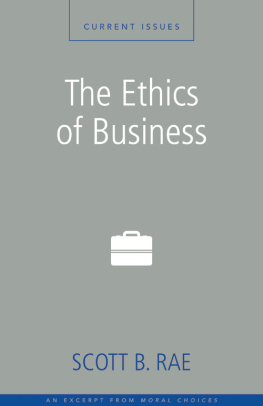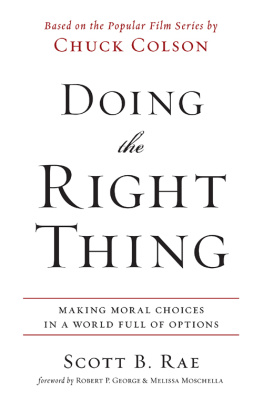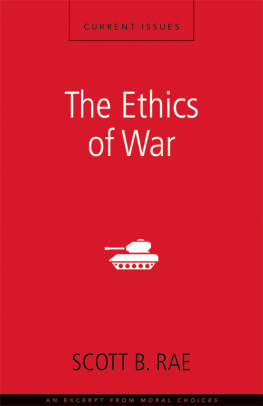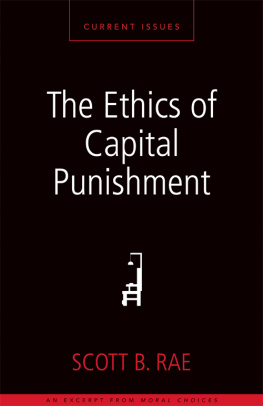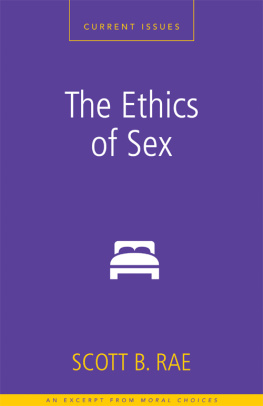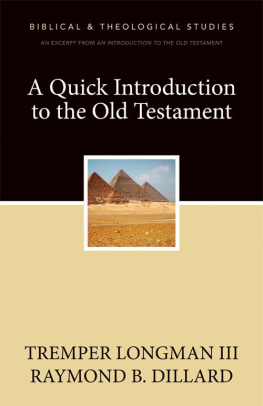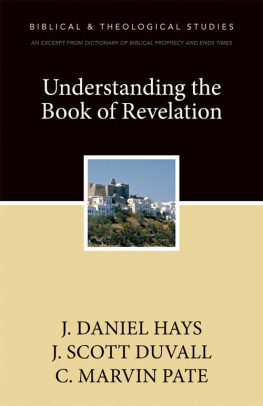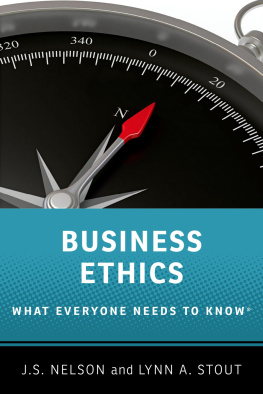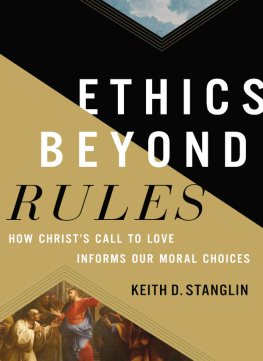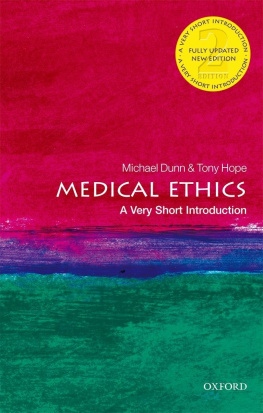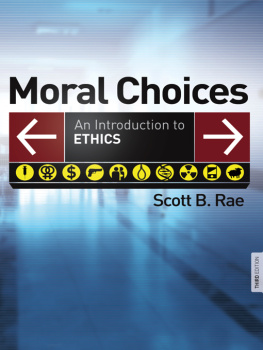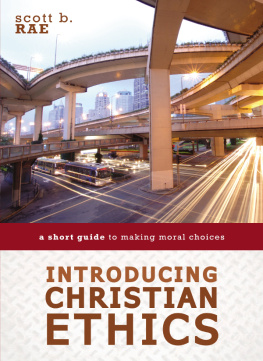ZONDERVAN
The Ethics of Business
Previously published in Moral Choices
Copyright 1995, 2000, 2009 by Scott B. Rae
All rights reserved under International and Pan-American Copyright Conventions. By payment of the required fees, you have been granted the non-exclusive, non-transferable right to access and read the text of this e-book on-screen. No part of this text may be reproduced, transmitted, downloaded, decompiled, reverse engineered, or stored in or introduced into any information storage and retrieval system, in any form or by any means, whether electronic or mechanical, now known or hereinafter invented, without the express written permission of Zondervan.
EPub Edition JANUARY 2012 ISBN: 978-0-310-49646-5
Requests for information should be addressed to:
Zondervan, Grand Rapids, Michigan 49530
The Library of Congress has cataloged the original edition as follows:
Rae, Scott B.
Moral choices: an introduction to ethics / Scott B. Rae3rd ed.
p. cm.
ISBN 978-0-310-29109-1 (hardcover)
1. Ethics. I. Title.
BJ1012.R32 2009
170dc22 2009005151
All Scripture quotations, unless otherwise indicated, are taken from the Holy Bible, New International Version. NIV. Copyright 1973, 1978, 1984 by International Bible Society. Used by permission of Zondervan. All rights reserved.
All Scripture quotations marked TNIV are taken from the Holy Bible, Todays New International Version. Copyright 2001 by International Bible permission of Zondervan. All rights reserved.
Scripture quotations marked KJV are taken from the King James Version of the Bible.
Scripture quotations marked NASB are taken from the New American Standard Bible. Copyright 1960, 1962, 1963, 1968, 1971, 1972, 1973, 1975, 1977, 1995 by The Lockman Foundation. Used by permission.
Any Internet addresses (websites, blogs, etc.) and telephone numbers in this book are offered as a resource. They are not intended in any way to be or imply an endorsement by Zondervan, nor does Zondervan vouch for the content of these sites and numbers for the life of this book.
All rights reserved. No part of this publication may be reproduced, stored in a retrieval system, or transmitted in any form or by any meanselectronic, mechanical, photocopy, recording, or any otherexcept for brief quotations in printed reviews, without the prior permission of the publisher.
Cover design: Ron Huizinga
Interior design: Matthew Van Zomeran
Think about all the companies that have been associated with ethical scandals in the past few yearscompanies like Enron, Countrywide, and AIG. The collapse of many banks and mortgage companies that led to the financial crisis in 20089 contributed to a general sense that these industries lost their way and failed to serve the community. There is a widespread perception in the general public that the business community has lost its moral compass and that greed is the overriding principle governing how business is done. Business ethics is widely considered an oxymoron.
But the excesses and scandals of the past few years have also made people realize that ethics does matter and that doing business in the right way morally makes a difference. A special issue of Business Week was devoted to 25 Ideas for a Changing World. At the top of the list of these ideas was the idea of integrity. As they put it, Trust, fairness and integrity matter, and they matter to the bottom line.
The intersection of ethics and economics, particularly in an increasingly global economy, raises substantial issues that are current in public discussion and are commonly considered a matter for politicians and public policy as well as managers and executives. These issues include the following:
Outsourcing of domestic jobs to foreign countries
Sweatshops with subsistence wages and questionable working conditions
The use of child labor
Widely variable environmental standards around the world
Global climate change
Economic justice in the distribution of the worlds resources, such as food, energy, and health care
Resurgence of slavery and human trafficking worldwide
Then there are issues related to business ethics, such as information disclosure/bluffing; issues in sales, marketing, and advertising relating to truth in marketing, product safety, environmental ethics, and corporate social responsibility; issues in accounting and finance related to accurate disclosure of information and fairness in the access to the market (i.e., insider trading); and issues in human resources management, such as sexual harassment, the right to privacy in the workplace, and conflicts of conscience among employees.
Finally, there are issues of personal financial management that have to do with a persons attitude toward money and possessions, the issues of how much is enough, the balance between generosity and responsibility for oneself and ones family, and the exercise of proper stewardship of ones finances.
Of course, each of these areas could be the subject of entire books, and many volumes have been written on each of these general areas. A full treatment of all of these areas of current discussion is well beyond what we can do here. But I can introduce you to the main issues in this area and help you integrate your worldview into this critical area. In this essay you will receive an introduction to the primary fundamental questions in economic ethics. Some have to do with the moral assessment of the market system of global capitalism. Others have to do with ethical behavior in the workplace. You will also receive a brief introduction to some of the more specific debated issues, such as sexual harassment and insider trading.
Economic Life in the Bible
The Bible has a great deal to say about money and wealth. In fact, there are more references to money in the Bible than there are to eternity. Integrating the Bibles teaching with many of these debated issues is often very challenging, because the Bible was written to a very different socioeconomic culture than the one you work in or will soon work in. In fact, it would be hard to imagine two worlds more different when it comes to economic life.
That does not mean that the Bible has nothing of relevance for todays economic world, only that we must use the Bible carefully when applying its general principles of economic life to current times. A direct application of many biblical commands relating to economic life would be impossible today, because the system to which those commands were addressed has dramatically changed. Rather, we are seeking from Scripture general principles or norms that govern economic life and can be applied to different economic arrangements. Of course, some commands apply directly, for which the differences between the ancient world and todays society do not affect the application of the text. For example, the repeated admonitions of Scripture to take care of the poor remain directly applicable, even though the means by which that is done may have changed. By contrast, the Old Testament commands the people of Israel to keep a sabbatical year, allowing the land to lie fallow for one year in seven (Lev. 25:17), and the Year of Jubilee, in which all land was returned to its original owners every fiftieth year (vv. 1017). These principles cannot be directly applied today, because they were written to a society that revolved around agriculture, not a modern information age economy in which very few people are tied to the land to make their living. Rather, we must glean a general principle from each of these commands that can be applied to the different setting of today.
The pursuit of wealth in the ancient world was fraught with potential problems, which made it easy to view those who possessed wealth with moral and spiritual skepticism. Although the temptations facing the pursuit of wealth today should not be minimized, some important differences exist between the modern and ancient economic systems that may partially account for the strong cautions in the Bible about wealth. For example, in the ancient world, as a general rule, people became wealthy differently than in todays market system. The ancient economic system was largely centered on subsistence agriculture with limited commerce and trade. Real estate was the predominant productive asset. The ancient economy is best described as what is called a zero-sum game. The pool of economic resources was relatively fixed, so that when one person became wealthy, it was usually at the expense of someone else. Stated differently, the economy was like a pie. When someone took a larger piece, someone else received a smaller piece. This set up numerous opportunities to attain wealth abusively by theft, taxation, or extortion.

